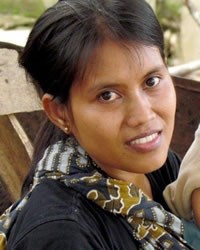Rejang in Indonesia

Photo Source:
Copyrighted © 2026
International Mission Board-SBC - Jacob Talley All rights reserved. Used with permission |
Send Joshua Project a map of this people group.
|
| People Name: | Rejang |
| Country: | Indonesia |
| 10/40 Window: | Yes |
| Population: | 414,000 |
| World Population: | 414,000 |
| Primary Language: | Rejang |
| Primary Religion: | Islam |
| Christian Adherents: | 0.04 % |
| Evangelicals: | 0.02 % |
| Scripture: | New Testament |
| Ministry Resources: | Yes |
| Jesus Film: | Yes |
| Audio Recordings: | Yes |
| People Cluster: | Minangkabau-Rejang of Sumatra |
| Affinity Bloc: | Malay Peoples |
| Progress Level: |
|
Introduction
An interesting trait of the Rejang is that children are given opportunities to speak and make their own decisions from a young age. Parents respect and support these decisions, even when they are wrong. Educational facilities are readily available in the Rejang area, from elementary schools to high schools and technical schools. However, most children do not take full advantage of these opportunities. The most common reason for dropping out of school is to get married. This normally is not a result of pressure from parents but arises from the student's own initiative. These young marriages usually last only a few months or years before ending in divorce. Many later choose to return to school after their divorce. Unemployment is high among them; many young people drop out of school to marry at an early age.
Ministry Obstacles
There are so few Rejang who have accepted Christ that they will need to hear the precious gospel from outsiders.
Outreach Ideas
Pray for the Followers of Christ
Pray for the Entire People Group
Ask God to prepare and send caring, faithful believers to the Rejang.
Ask God to send dreams and visions to the elders and for spiritual discernment among the people so that they may be drawn to Jesus.
Ask God to show them his glory daily, and that they will have ears to hear and eyes to see Jesus.